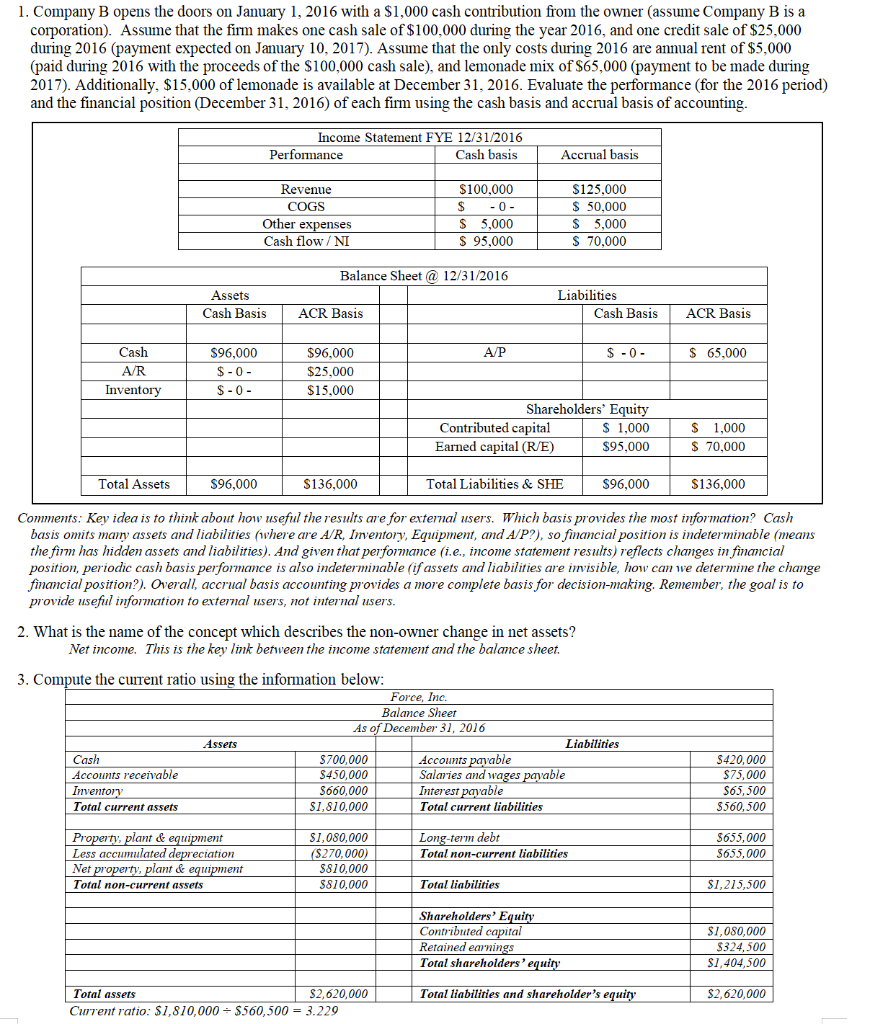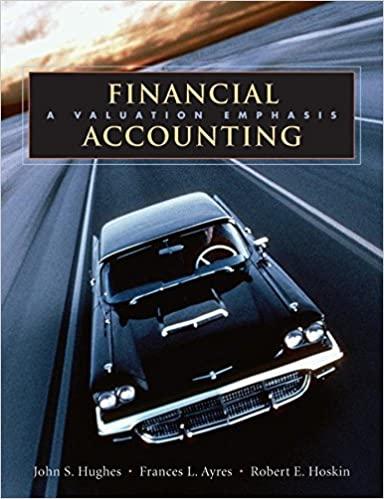Use the following image (only if needed), to answer the T/F question below.
QUESTION:
Accruals such as accounts receivable and account payable are essentially forecasts of future cash flow.
o True
o False

1. Company B opens the doors on January 1, 2016 with a $1,000 cash contribution from the owner (assume Company B is a corporation). Assume that the firm makes one cash sale of $100,000 during the year 2016, and one credit sale of $25,000 during 2016 (payment expected on January 10, 2017). Assume that the only costs during 2016 are annual rent of $5,000 (paid during 2016 with the proceeds of the $100,000 cash sale), and lemonade mix of $65,000 (payment to be made during 2017). Additionally, $15,000 of lemonade is available at December 31, 2016. Evaluate the performance (for the 2016 period) and the financial position (December 31, 2016) of each firm using the cash basis and accrual basis of accounting. Income Statement FYE 12/31/2016 Performance Cash basis Accrual basis Revenue COGS Other expenses Cash flow / NI $100,000 $ -0- $ 5,000 $ 95,000 $125,000 $ 50.000 $ 5,000 $ 70.000 Balance Sheet @ 12/31/2016 Assets Cash Basis Liabilities Cash Basis ACR Basis ACR Basis $ - 0 - $ 65,000 Cash AR Inventory $96,000 $-0- $-0- $96,000 $25,000 $15.000 Shareholders' Equity Contributed capital $ 1,000 Earned capital (R/E) $95.000 $ 1,000 $ 70,000 Total Assets $96,000 $136,000 Total Liabilities & SHE $96,000 $136,000 Comments: Key idea is to think about how useful the results are for external users. Which basis provides the most information? Cash basis omits many assets and liabilities (where are A/R, Inventory, Equipment, and A/P?), so financial position is indeterminable (means the firm has hidden assets and liabilities). And given that performance (i.e., income statement results) reflects changes in financial position, periodic cash basis performance is also indeterminable (if assets and liabilities are invisible, how can we determine the change financial position?). Overall, accrual basis accounting provides a more complete basis for decision-making. Remember, the goal is to provide useful information to external users, not internal users. 2. What is the name of the concept which describes the non-owner change in net assets? Net income. This is the key link between the income statement and the balance sheet. 3. Compute the current ratio using the information below: Force, Inc. Balance Sheer As of December 31, 2016 Assets Liabilities Cash $700,000 Accounts payable Accounts receivable $450,000 Salaries and wages payable Inventory S660,000 Interest payable Total current assets $1,810,000 Total current liabilities $420,000 $75,000 $65,500 $560.500 Property, plant & equipment Less accumulated depreciation Net property, plant & equipment Total non-current assets $1,080,000 ($270,000) $810,000 $810,000 Long-term debt Total non-current liabilities 5655,000 $655,000 Total liabilities $1,215,500 Shareholders' Equity Contributed capital Retained earnings Total shareholders' equity $1.080,000 $324,500 $1,404,500 Total liabilities and shareholder's equity $2,620,000 Total assets $2,620,000 Current ratio: $1,810,000 = $560,500 = 3.229







